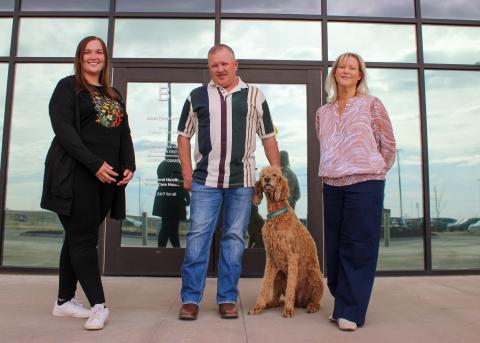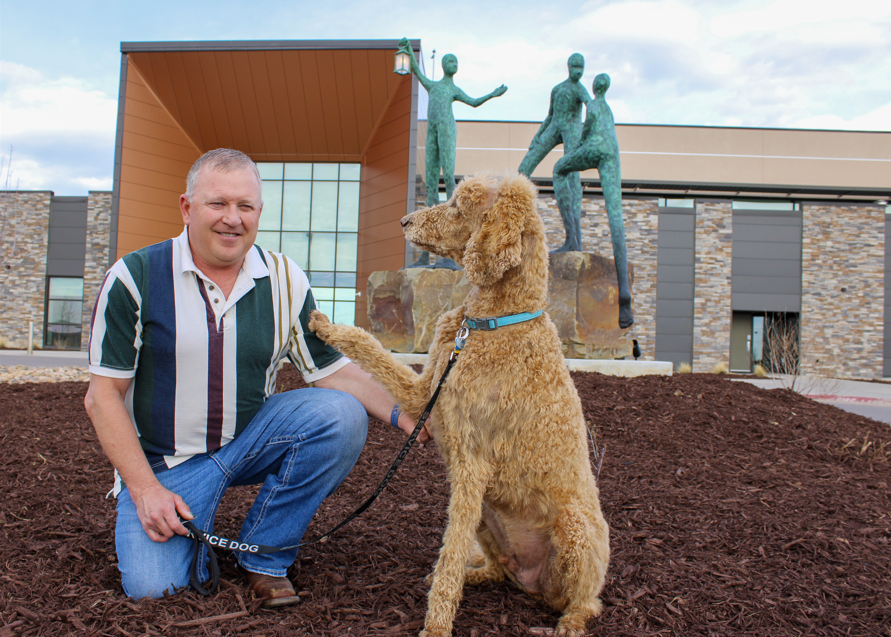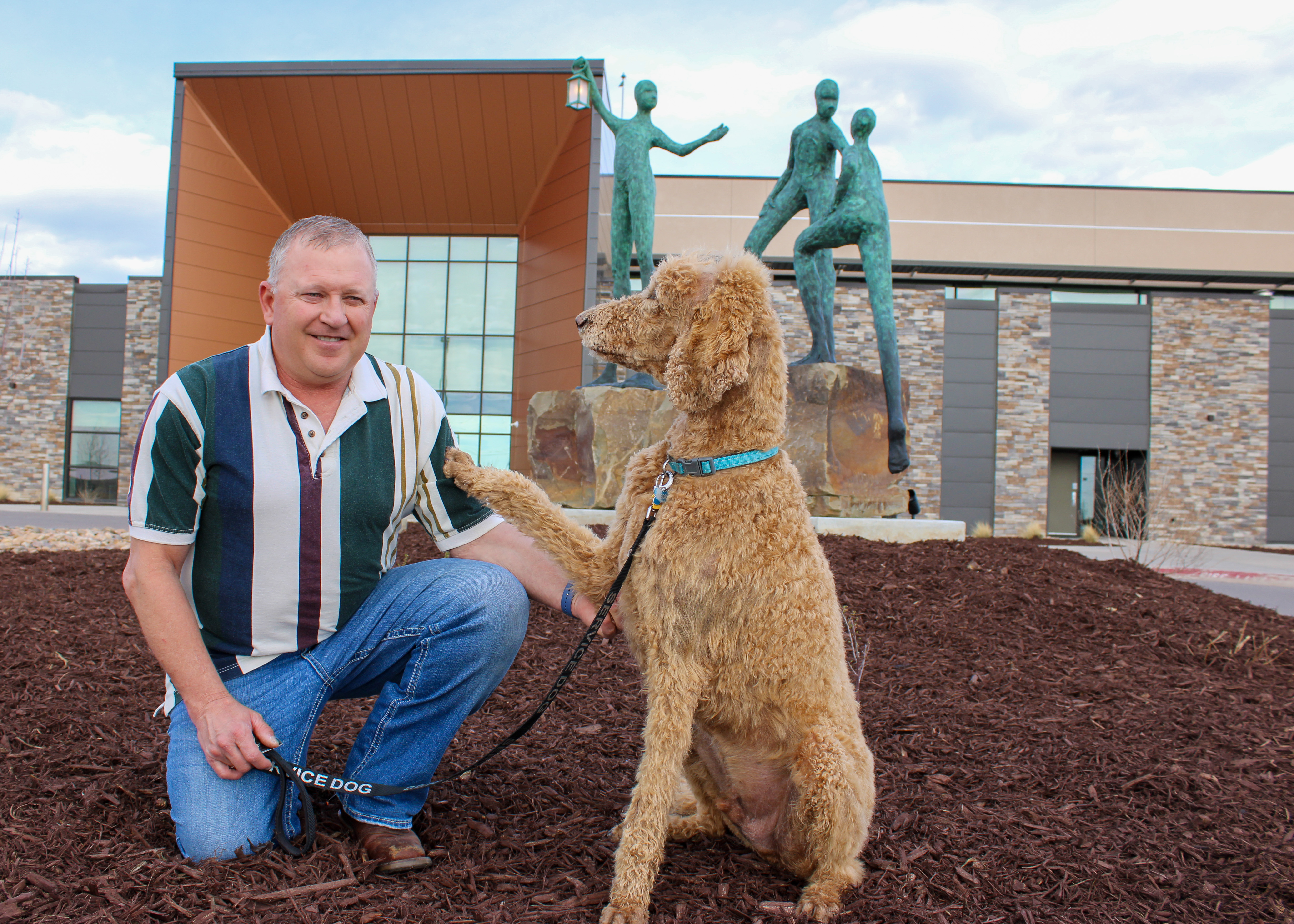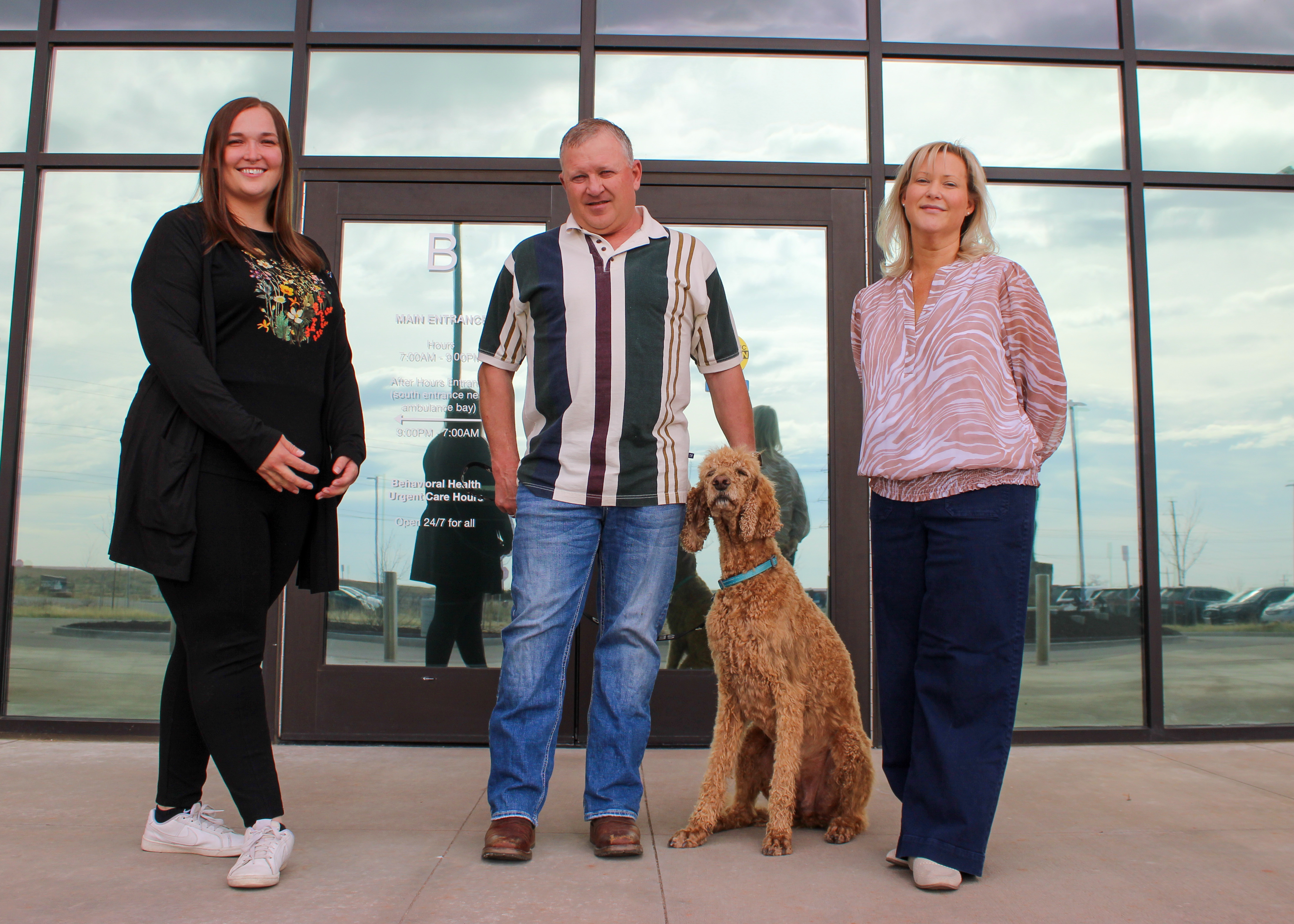Sobriety is possible: Larimer County Longview behavioral health center's 1st client a success story
Steffen Essen, of Loveland, shares story in hopes of inspiring others to seek treatment
Steffen Essen used to drive to the liquor store in his pickup at 7:30 a.m., tears streaming down his face. What’s sad, he said, is he wasn’t first in line.
“(The owner) was watching me die, one shooter at a time,” Essen, 51, said.
The lifelong Loveland resident, and those closest to him, believe he was weeks from death when he waited for the doors to open for the first time Dec. 2, 2023, at Larimer County’s taxpayer-supported behavioral health crisis center.

Assisted by a walker due to significant health conditions and unable to write even his initials, he entered the Acute Care facility at Longview campus at 8 a.m. and said he wanted to get sober. This made him the first client to be admitted to the state-of-the-art, crisis, mental health, and substance-use services center that is funded by Larimer County’s 20-year behavioral health tax initiative.
Walking on his own this time, Essen returned to Acute Care on Dec. 2, 2024 – the facility’s first-year anniversary – with his one-year sobriety coin in hand. He wanted to share it with the SummitStone Health Partners team at Longview as a token of his deep appreciation.
“I’ll vouch for Longview,” said Essen, who bounced between stints in substance-use treatment and glimpses of sobriety for much of his adult life.
“Nothing was working, and this worked.”
‘I’ve never been a bar guy’
Substance-use disorder, or addiction, doesn't discriminate based on age, race, spirituality or income. Essen is one among about 40.3 million people, ages 12 years and older, who reportedly have a substance-use disorder in the U.S., national data show.
The disease is treatable but often brings with it layers of complexity and hardship for the people suffering from it and those around them.
Essen was maybe 7 years old when he got his first taste of alcohol. Thirsty from cutting firewood while camping with his dad, uncle, and brother in Rangely, Colorado, he couldn’t reach the water and grabbed what he didn’t know then was boxed wine. It was gross, but he drank more.
He grew up in the country, between Loveland and Berthoud – milking cows before and after school, mowing lawns to make a few bucks, and getting into rodeo in his late teens. He and his traveling buddies would drive 1,000 miles and crawl, exhausted, atop a bull to compete, so there was no place for drinking or doing drugs. They used ibuprofen and Tylenol to numb their pain.
“I know a lot about cows, horses, ranching and farming,” said Essen proudly, wearing a gray and white button-down shirt with pearlescent buttons and brown cowboy boots as weathered as his hands.
He was never a “bar guy” but started having a beer, and then two, and then four with dinner after his 12-to-14-hour workdays, sometime in his late 20s to early 30s. He knew he had a problem when he couldn’t stop. It got in the way of work and relationships, including with his now ex-wife.
“I just got hijacked. So many people do get hijacked by alcohol,” said Essen, who has a “lot of resentment” toward the substance. “It was not my god but my master.”
Essen apologized often for pausing while telling his story in March 2025. His light blue eyes light up, as he looks west out of the windows at Longview toward the Larimer County landfill, where trucks crawl back and forth across the dusty landscape.
He has Wernicke-Korsakoff syndrome, a serious brain condition that is usually, but not exclusively, associated with chronic alcohol misuse and severe alcohol-use disorder. He struggles to remember long periods of his life, and neurologic symptoms have made it difficult for him to live normally.
His 40s were a blur of sober periods and a revolving door of regional treatment centers, marked by near-death incidents – from comas to car crashes. His sister and brother-in-law, his “very nice” neighbors, and a team of behavioral health professionals fought all along to get him help.
“I would also say that Remi kept you alive,” said Jamie Powell, a licensed addiction counselor, licensed clinical social worker, and program supervisor for SummitStone Health Partners, which is contracted for services at the Acute Care facility at Longview campus.
Lighting up at this assessment, Essen agrees with his therapist and pets Remi, the apricot-colored standard poodle he adopted as a puppy. Remi has not only grown in stature since that day in 2019, but he’s grown in connectedness with the man he protects in his role as Essen’s service dog. More than that, though, they are “best friends,” who go everywhere and do everything together.
The ‘magic combination’ that worked
The Acute Care facility at Longview campus has few peers across the nation. It represents an unique, public-private partnership between Larimer County and longtime nonprofit SummitStone Health Partners, which is contracted to provide services.
Nestled against the foothills, between Loveland and Fort Collins, it is open 24 hours a day, seven days a week, 365 days a year, to people of all ages. Behavioral health urgent care, withdrawal management, crisis stabilization, fitness center, pharmacy and more – Longview offers all of it in one place.
When things went from bad to worse, Powell and Essen’s neighbors worked together to get him to Longview. One neighbor took care of Remi – a barrier for many seeking treatment – and another, Dennis, drove Essen to the facility.
Essen had been turned away from other treatment centers in the past because of his serious medical conditions, but the Acute Care facility was designed to be different. Led by innovators in their respective fields, the Acute Care team takes an integrated approach to caring for each client’s body, mind, and spirit.
Nurses, family medicine physicians, therapists, addiction specialists, peer specialists, pharmacists, and more, work as one to provide higher levels of care that weren’t previously available in one place in Northern Colorado. Longview had a place for Essen that day in December 2023.

Madi Montes, a SummitStone clinical program supervisor, and licensed addictions counselor and licensed clinical social worker, did Essen’s assessment that morning and admitted him onto the withdrawal management unit.
On March 28, 2025, as part of this story, she saw Essen for the first time since he was discharged from care. They came together to increase awareness of substance-use disorder and the power of treatment.
“We don’t get to see that and get to close the door for ourselves,” Montes said of her and so many behavioral health professionals who see people in their hardest moments but don’t know how things turn out after they leave their care.
“It was inspiring for us,” she told Essen, for the team of SummitStone staff who were there in December 2024 when he came back with his sobriety coin. “It was such a powerful story for not just me but for all of the staff to hear.”
“It was inspiring for me, too,” he said.
Powell, who grew up in the community and has always been a helper, believes it’s unfair that substance-use disorder is stigmatized “unlike other chronic conditions.” Addiction, she said, doesn’t discriminate; it’s everywhere.
The key, she said, is for each person to find the “magic combination” that works best for their treatment. For some, that may be receiving initial care at Longview, followed by participation in a 12-step program; peer support; or doing individual, group or family therapy alongside prescribed medications to control cravings.
“I absolutely believe that recovery is possible for every single person,” she said.
Essen said he’s hard on himself and talks often about personal accountability.
“The problems in your life are self-inflicted. You’ve got to own that,” he says, scratching the top of Remi’s slightly balding head.
Sitting across the table, Powell says: “I just want to push back on that. This is a disease. Your brain was telling you you needed it to survive, just like air.”
It’s not a moral or character flaw, she adds.
Essen nods, and the two laugh easily about their disagreement, showing the trust that has been built between them.
“That’s part of recovery,” Powell says. “Learning to love yourself and forgive yourself and move forward.”
In spring 2025, Essen is due in Larimer County court for legal issues associated with past alcohol use. He is ready and willing to accept the consequences of his actions, he said, and continue his journey no matter what happens next.
“I want to live life. What I have left of it, I want it to be sober.”

Need support with substance-use disorder (addiction)?
- Not sure where to begin?
- Call SummitStone Health Partners at 970-494-4200 ext. 4 if you or someone you know is experiencing a behavioral health crisis. They may refer you to a resource within SummitStone; if not, they will connect you with a resource within the community that works best.
- The Acute Care facility at Longview campus has a withdrawal-management unit, including medically supervised detox, which wasn’t previously available in Larimer County.
- The doors are open 24/7 to people of all ages at 2260 W. Trilby Road in Fort Collins.
Madeline Novey
Communication Specialist
Behavioral Health Services
970-619-4255
noveyme@co.larimer.co.us
Click a photo to enlarge.




